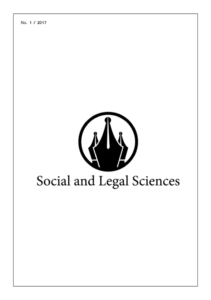Quo vadis ukrainian patent reform in the frame of EU-Ukraine association agreement
Quo vadis ukrainian patent reform in the frame of EU-Ukraine association agreement
Author(s): Oksana KashyntsevaSubject(s): Human Rights and Humanitarian Law, EU-Legislation
Published by: Lukas Varhol
Keywords: patent law; intellectual property; human rights; access to medicines; compulsory license; date exclusivity; EU-Ukraine Association Agreement; TRIPS flexibilities
Summary/Abstract: The article concerns the issues of harmonization of Human Rights and Intellectual Property Rights in the sphere of Medicine and Pharmacy. In one side, Ukraine is still balancing as a country with the middle and low income and which has legal backgrounds to use TRIPS flexibility provisions. In other side, Ukraine has to keep balance with Ukrainian-EU Association Agreement in the field of protection of Intellectual Property. Ukrainian Government demonstrates the Political Will to provide the National Reforms on the basis of Rule of Law and priority of Human Rights. The reforming in Heath Care is impossible without the ensuring the access to the essential medicines and the mechanisms of Intellectual Property could have the substantial impact into this process. Ukraine is a country-party to the major international treaties in the sphere of Intellectual Property and in particular in International Patent Law: Paris Convention for the Protection of Industrial Property, Patent Cooperation Treaty, Agreement on Trade-Related Aspects of Intellectual Property Rights (TRIPS) etc. As a country-party of the TRIPS agreement Ukraine was obliged to take the most strength obligations in protection of intellectual property which are determined by the TRIPS-plus. The very important provision for Ukraine is Article 219 of Ukraine–EU Association Agreement which determines that Parties recognize the importance of the Declaration on the TRIPS Agreement and Public Health, adopted on 14 November 2001. In present time in Ukraine it is enough Political Will to realize patent reform basing on the TRIPS flexibilities' provisions. According to the Report of WIPO in the period of 2000-2015 the share of national patents in the field of medical technologies is near 9.85%, in medicines - 5.5% of all patents in all fields of technology in Ukraine. In comparison, in Germany in the same period the share of patents granted in the field of medical technologies in relation to other sectors of technologies is only 3.89%, in medicines - 3, 64%; in Poland the share of national patents granted in the field of medical technologies is 3.81% (in the field of drugs data available); in Austria in the field of medical technologies - 3.9%; in Spain in the field of medical technologies – near 4.82%. However, this statistic information does not reflect the real situation in Ukrainian Health Care. It reflects the gapes of national patent legislation which allows granting weak patents in the field of medicine and pharmacy. Because of the excessive workload of the patent offices, understaffing and low requirements to the patent granting, pharmaceutical companies obtain unmerited patent monopolies, which do not actually comply to the universally acceptable patentability standards — novelty and innovation level. Thus, the Ukrainian patent reform presumes the following steps. The first one is the excluding from the patentability objects the methods of diagnostic, treatments and surgery and introducing more stringent patentability criteria with regard to pharmaceutical inventions. The draft legislation prohibits to patent new forms of a known from the state of the art medicinal product, including salts, esters, complex ethers, compositions, combinations and other derivatives, polymorphs, metabolites, pure forms, particle sizes, isomers, new dosage forms, or any new property or a new use of a known medicinal product, except those that lead to a significant increase in the therapeutic efficacy of the medicinal product, as evidenced by the research results. Implementing the mechanism of approving the patents on medicines granting by Patent Office (Ukrpatent) by the Sate Expert Center of Ministry of Health of Ukraine could help to patent truly innovative pharmaceutical products and to avoid granting the "evergreening patents". The second one is the implementation of the Bolar regulatory exclusion which allows to generic producer to conduct studies, research and tests for the medicines' regulatory approval and other related acts for preparation to obtain marketing authorisation. Such provision is closely binned with the patent linkage provision which takes place in Ukrainian pharmaceutical legislation. The supplementary protection certificates on inventions (SPC) as a legal instrument of extortion of patent rights is also very sensitive part of patent reform. The main idea of granting such supplementary protection is that the moment when the period that elapses between the filing of a patent application for a new medicinal product and obtaining the marketing authorisation to the same medicinal product makes the period of effective protection under the patent less than 20-years. However, in the international Intellectual Property doctrine the strict connection of such two different procedures are very disputable. However, the obligation to implement of such supplementary protection is directly determine in the Ukraine-EU Association Agreement and Ukraine should keep the balance between TRIPS flexibilities and TRIPS-plus. The other important step of patent reform is implementing of pre-granting and improvement of post-granting patent oppositions procedures which allows to formally challenge the validity of a pending patent application on the determines by the legislation grounds, such as innovative step, new results in treatments, new efficacy and etc. Such TRIPS instrument as compulsory licensing has never been used in Ukraine because of the gapes of national legislation proper determined procedure, despite that such provisions were declared in the valid legislation.
Journal: Social and Legal Sciences
- Issue Year: 1/2018
- Issue No: 2
- Page Range: 29-40
- Page Count: 12
- Language: English

